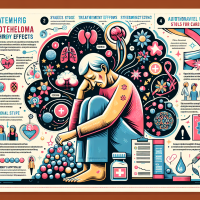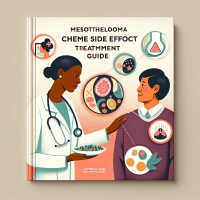Understanding Mesothelioma Chemotherapy Side Effects: A Compassionate Guide
Hi, I’m a registered nurse with over 10 years of oncology experience. I understand that facing mesothelioma and its treatments is one of life’s most challenging journeys. In this guide, I share not only medically sound information about mesothelioma chemotherapy side effects but also heartfelt strategies for managing those effects both physically and emotionally. Our conversation is personal, compassionate, and deeply rooted in real experiences. Together, let’s explore the complexities of treatment while embracing hope and resilience.

Understanding Mesothelioma Chemotherapy and Its Side Effects
Mesothelioma chemotherapy is a crucial part of treatment, using drugs that target cancer cells to slow disease progression. However, like any treatment, it comes with a range of side effects. I know many of you might be wondering: How can we manage these side effects while continuing to face each day with hope and determination?
What are the Common Side Effects?
Many patients experience side effects such as nausea, fatigue, hair loss, and susceptibility to infections. These reactions are not only physically challenging but can also impact your emotional well-being. I believe acknowledging these struggles is the first step in taking back control of your health.
A Deeper Dive: The Mechanism Behind the Side Effects
The drugs used in chemotherapy are designed to kill rapidly dividing cancer cells. Unfortunately, they may also affect healthy cells, leading to side effects. Detailed understanding can empower you to communicate with your healthcare teams effectively. Patients often need to manage:
- Nausea and vomiting: Managing nutrition and hydration becomes essential.
- Fatigue: Rest and a balanced energy schedule can help mitigate exhaustion.
- Weakened immune system: Proactive care in avoiding infections.
- Hair loss: This can be distressing, prompting many to seek supportive counseling and connect with community resources.
Managing and Relieving Side Effects with Compassionate Care
Throughout my career, I have seen that a holistic approach is key—managing physical side effects while nurturing your emotional spirit. Below are some detailed strategies that have helped many of my patients and me personally as we navigated these challenges together.
Practical Tips for Managing Side Effects
- Nutrition and Hydration: Small, frequent meals and staying hydrated can significantly help ease nausea and fatigue. I recommend speaking with a nutritionist who understands the complexities of cancer treatment.
- Rest and Activity Balance: Gentle exercises, such as short walks or light stretching, can boost your overall well-being without depleting your energy.
- Pain and Discomfort Management: Medications prescribed by your doctor, along with alternative therapies such as acupuncture or massage, may provide relief.
- Communication: Always inform your health care provider about any new or worsening side effects. This ensures that your management plan is continually updated and personalized.
Emotional and Mental Health Support
The emotional toll of chemotherapy is just as significant as the physical side effects. I encourage you to seek support from counseling services, support groups, and trusted loved ones. It’s important to allow yourself moments for vulnerability as well as hope.
A Personal Reflection: I once cared for a patient who felt isolated by her treatment. Together, we discovered that by simply sharing our feelings, we could lighten the emotional burden. Remember, you are not alone. Reach out and embrace the support available around you.
Understanding Diagnosis, Staging, and Treatment Options
To better understand your journey, it’s helpful to grasp the basics of how mesothelioma is diagnosed and staged. Typically, medical professionals may use various types of biopsies such as thoracoscopy (a camera-assisted procedure to look inside the chest) or thoracentesis (removing fluid from around the lungs) to confirm the diagnosis. Once confirmed, mesothelioma is staged from I to IV, where Stage I indicates a localized cancer and Stage IV shows more extensive spread of the disease.
Treatment Modalities: Beyond Chemotherapy
While chemotherapy forms the backbone of your treatment, many patients also consider surgery, radiation therapy, or experimental clinical trials. Each treatment plan is uniquely tailored, taking into account the stage of the disease, overall health, and personal preferences. I strongly advise discussing all available options with your healthcare team to find the best path forward.
Tangible Tools & Practical Resources for Coping
In addition to medical treatment, tangible tools can help you navigate your daily challenges. Below are some resources and practical advice that I have seen make a difference:
A Checklist for Doctor Appointments
Prepare for each appointment by keeping a checklist. Here are some helpful pointers:
- Write down all your questions and concerns before your visit.
- Record notes during the appointment for follow-up discussion.
- Keep a symptom diary to track changes and patterns.
This checklist empowers you to have productive discussions with your medical team. I share this from experience, and I hope it brings you clarity in your conversations with your oncologist.
A Guide to Understanding Your Pathology Reports
Your pathology report is a key document that outlines your diagnosis and staging. In simple terms, it details the type of cells involved and the extent of the disease. I encourage you to ask your doctor to explain any terms you do not understand—knowing more can help ease the anxiety about your treatment journey.
Navigating Emotional Challenges: From My Heart to Yours
Living with mesothelioma is not just about coping with physical symptoms—it’s also about managing the emotional roller coaster that accompanies such a diagnosis. I have seen firsthand how anxiety, uncertainty, and grief can overwhelm even the strongest among us. Here are some gentle strategies that have helped me and many patients I have supported:
Practical Techniques for Emotional Well-being
- Mindfulness and Meditation: Consider setting aside a few minutes each day to sit quietly, concentrating on your breath. This practice can calm your mind and promote a feeling of inner resilience.
- Counseling and Support Groups: Connecting with others who understand your experience provides a safe space to share your fears and hopes. Whether it’s one-on-one counseling or a support group, sharing your journey can lighten your emotional load.
- Expressive Writing: Maintaining a journal to document your thoughts and feelings can be an excellent outlet for stress. Sometimes, putting pen to paper reveals truths that quietly nurture healing.
Remember, it’s okay to grieve and to feel overwhelmed. Your emotional journey is unique, and every step towards self-care is a victory.
Resources and Next Steps
In these challenging moments, please consider the following actionable next steps:
- Consult with your healthcare professional: Prioritize open, honest dialogue about your side effects and overall treatment plan.
- Leverage reputable support organizations: Look into trusted sources like the National Cancer Institute, the American Cancer Society, and the Mesothelioma Applied Research Foundation for updated information. (Information current as of May 2025.)
- Connect with local support: Search for nearby NCI-designated cancer centers or mesothelioma specialists and support groups using recommended keywords in reputable directories.
As you contemplate these steps, know that the journey is not walked alone. My commitment is to share what I’ve learned and to stand beside you with compassionate guidance. For additional insights, you might explore treatment options and managing mesothelioma symptoms on our site.
From My Heart to Yours: Concluding Thoughts
I want to leave you with these gentle words: even when the road seems uncertain and the challenges overwhelming, there is always hope. Embrace the support offered by your healthcare team, lean on your loved ones, and remember that each small victory is a step towards greater well-being. I am here, sharing from my extensive experience, to remind you that you are valued, respected, and not alone in this journey.
Take the time to care for yourself, ask questions, and seek clarity in every step. Together, we can face the side effects of mesothelioma chemotherapy with courage, wisdom, and compassion.
Words of Encouragement I’ve Found Helpful
“Every day is a new day. The strength within you is greater than any challenge on your path.”
Please remember: this guide is meant to offer comfort, empower you with information, and provide actionable strategies. While every patient’s experience is unique, I hope that the insights shared here help you feel more in control and less isolated. Always consult with your healthcare provider for medical advice tailored to your situation.
With heartfelt care and support, I invite you to take the next step on your journey, confident in the knowledge that you are worthy of both compassionate care and the most up-to-date, accurate information.






